高中英语选修6 Unit 5
- 格式:ppt
- 大小:1.53 MB
- 文档页数:69

教师学科教案[ 20 – 20 学年度第__学期]任教学科:_____________任教年级:_____________任教老师:_____________xx市实验学校Unit 5 The power of nature1.教材分析本单元以The power of nature 为话题,旨在通过单元教学使学生了解火山爆发、地震、台风、洪水等自然现象,认识到自然的伟大力量,并会用所学词汇描述在经历自然灾害时的感受,思考人类应对自然灾害的态度和方法,提高自我保护意识。
1.1 Warming Up通过对火山爆发示意图的讨论激活学生了解与本单元话题相关的背景知识,而后通过讨论人类应对自然灾害的措施引发学生对本单元话题的思考,激发学生的求知欲,为随后进行的听、说、读、写打下基础。
1.2 Pre-reading通过回答问题测试自己是否适合作火山学家,让学生了解这一陌生职业,为阅读做好准备。
1.3 Reading部分一位火山学家以第一人称的形式讲述了自己的工作及第一次目睹火山爆发时的情景和心情,描写了人与自然的斗争与和谐相处的乐趣,使学生认识到火山是美丽的,但同时极具破坏力,而火山学家的工作可以减少由火山引发的损失。
1.4 Comprehending设计了两种题型:第一题要求学生在阅读后回答相关问题;第二题检测学生对文章细节的理解。
1.5 Learning about Language 分为词汇和语法两部分。
词汇部分着重从词的意义用法和表达方面对学生学习词汇给予指导;语法部分学习ing 形式在句子中作状语表示时间、原因及结果。
1.6 Using Language以语言实践为目的,包括四个部分的内容。
Listening and speaking 三位火山学家讲述了他们各自最惊险的一次经历。
学生在练习听力的同时学会描述害怕和紧张的词汇。
Speaking 是Listening的延续。
要求学生讲述自己类似的经历,同时在运用中巩固单词。
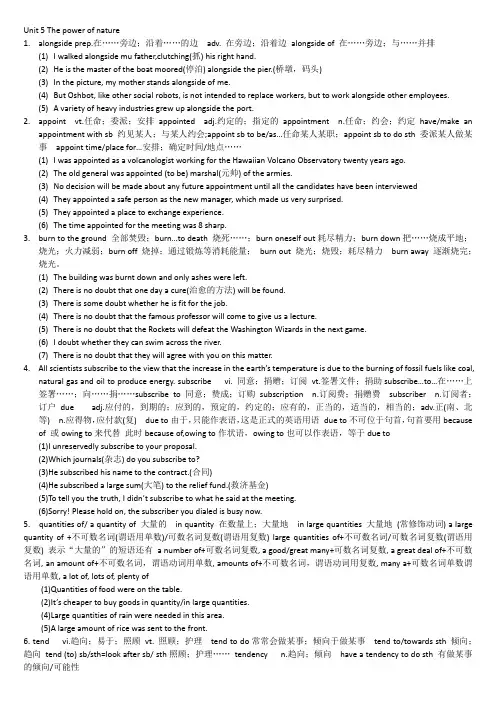
Unit 5 The power of nature1.alongside prep.在……旁边;沿着……的边adv. 在旁边;沿着边alongside of 在……旁边;与……并排(1)I walked alongside mu father,clutching(抓) his right hand.(2)He is the master of the boat moored(停泊) alongside the pier.(桥墩,码头)(3)In the picture, my mother stands alongside of me.(4)But Oshbot, like other social robots, is not intended to replace workers, but to work alongside other employees.(5) A variety of heavy industries grew up alongside the port.2.appointvt.任命;委派;安排appointed adj.约定的;指定的appointment n.任命;约会;约定have/make anappointment with sb约见某人;与某人约会;appointsb to be/as…任命某人某职;appoint sb to do sth委派某人做某事appoint time/place for…安排;确定时间/地点……(1)I was appointed as a volcanologist working for the Hawaiian Volcano Observatory twenty years ago.(2)The old general was appointed (to be) marshal(元帅) of the armies.(3)No decision will be made about any future appointment until all the candidates have been interviewed(4)They appointed a safe person as the new manager, which made us very surprised.(5)They appointed a place to exchange experience.(6)The time appointed for the meeting was 8 sharp.3.burn to the ground 全部焚毁;burn…to death 烧死……;burn oneself out耗尽精力;burn down把……烧成平地;烧光;火力减弱;burn off 烧掉;通过锻炼等消耗能量;burn out 烧光;烧毁;耗尽精力burn away 逐渐烧完;烧光。
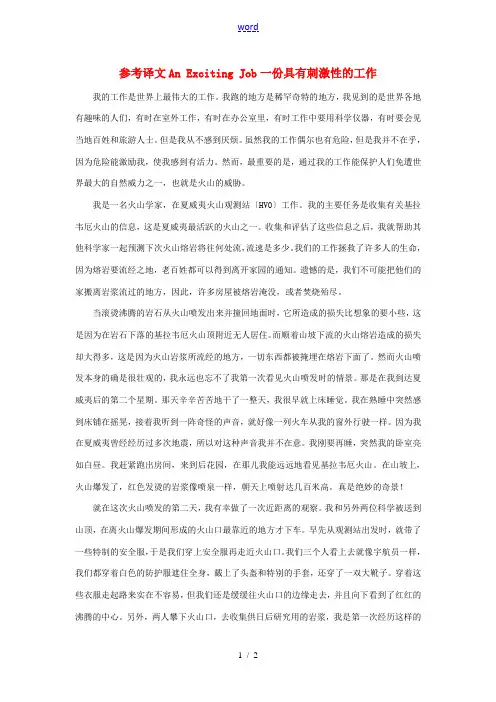
参考译文An Exciting Job一份具有刺激性的工作我的工作是世界上最伟大的工作。
我跑的地方是稀罕奇特的地方,我见到的是世界各地有趣味的人们,有时在室外工作,有时在办公室里,有时工作中要用科学仪器,有时要会见当地百姓和旅游人士。
但是我从不感到厌烦。
虽然我的工作偶尔也有危险,但是我并不在乎,因为危险能激励我,使我感到有活力。
然而,最重要的是,通过我的工作能保护人们免遭世界最大的自然威力之一,也就是火山的威胁。
我是一名火山学家,在夏威夷火山观测站〔HVO〕工作。
我的主要任务是收集有关基拉韦厄火山的信息,这是夏威夷最活跃的火山之一。
收集和评估了这些信息之后,我就帮助其他科学家一起预测下次火山熔岩将往何处流,流速是多少。
我们的工作拯救了许多人的生命,因为熔岩要流经之地,老百姓都可以得到离开家园的通知。
遗憾的是,我们不可能把他们的家搬离岩浆流过的地方,因此,许多房屋被熔岩淹没,或者焚烧殆尽。
当滚烫沸腾的岩石从火山喷发出来并撞回地面时,它所造成的损失比想象的要小些,这是因为在岩石下落的基拉韦厄火山顶附近无人居住。
而顺着山坡下流的火山熔岩造成的损失却大得多,这是因为火山岩浆所流经的地方,一切东西都被掩埋在熔岩下面了。
然而火山喷发本身的确是很壮观的,我永远也忘不了我第一次看见火山喷发时的情景。
那是在我到达夏威夷后的第二个星期。
那天辛辛苦苦地干了一整天,我很早就上床睡觉。
我在熟睡中突然感到床铺在摇晃,接着我听到一阵奇怪的声音,就好像一列火车从我的窗外行驶一样。
因为我在夏威夷曾经经历过多次地震,所以对这种声音我并不在意。
我刚要再睡,突然我的卧室亮如白昼。
我赶紧跑出房间,来到后花园,在那儿我能远远地看见基拉韦厄火山。
在山坡上,火山爆发了,红色发烫的岩浆像喷泉一样,朝天上喷射达几百米高。
真是绝妙的奇景!就在这次火山喷发的第二天,我有幸做了一次近距离的观察。
我和另外两位科学被送到山顶,在离火山爆发期间形成的火山口最靠近的地方才下车。
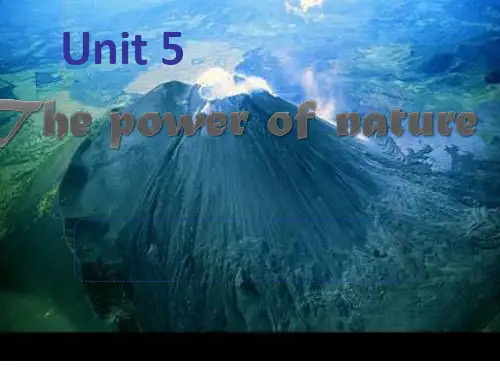
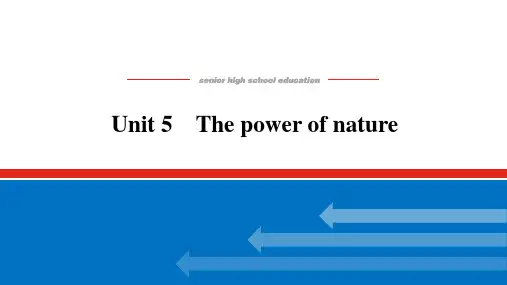
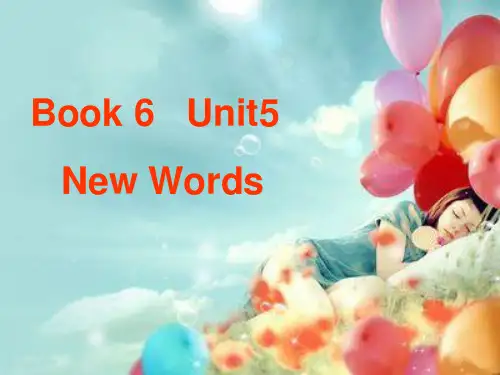
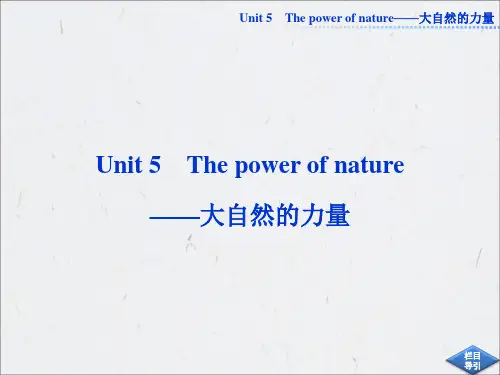
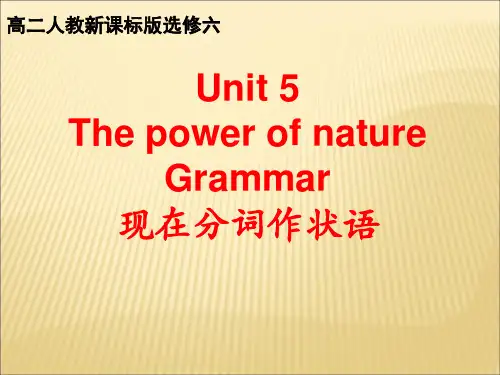
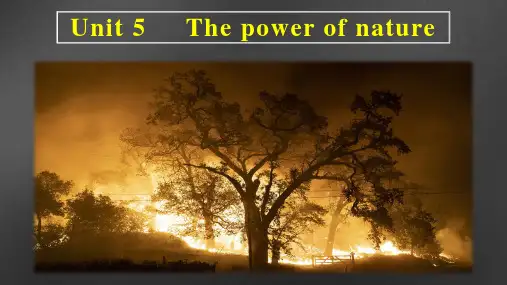
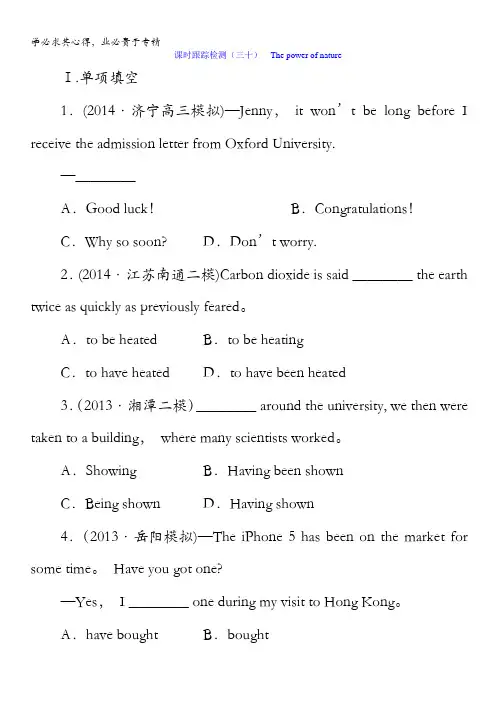
课时跟踪检测(三十)The power of natureⅠ.单项填空1.(2014·济宁高三模拟)—Jenny,it won’t be long before I receive the admission letter from Oxford University.—________A.Good luck!B.Congratulations!C.Why so soon? D.Don’t worry.2.(2014·江苏南通二模)Carbon dioxide is said ________ the earth twice as quickly as previously feared。
A.to be heated B.to be heatingC.to have heated D.to have been heated3.(2013·湘潭二模)________ around the university, we then were taken to a building,where many scientists worked。
A.Showing B.Having been shownC.Being shown D.Having shown4.(2013·岳阳模拟)—The iPhone 5 has been on the market for some time。
Have you got one?—Yes,I ________ one during my visit to Hong Kong。
A.have bought B.boughtC.had bought D.would buy5.(2014·山东莱芜高三期末考试)Attracting ________ senior citizens, Florida is ________ home to the largest population of elder Americans。
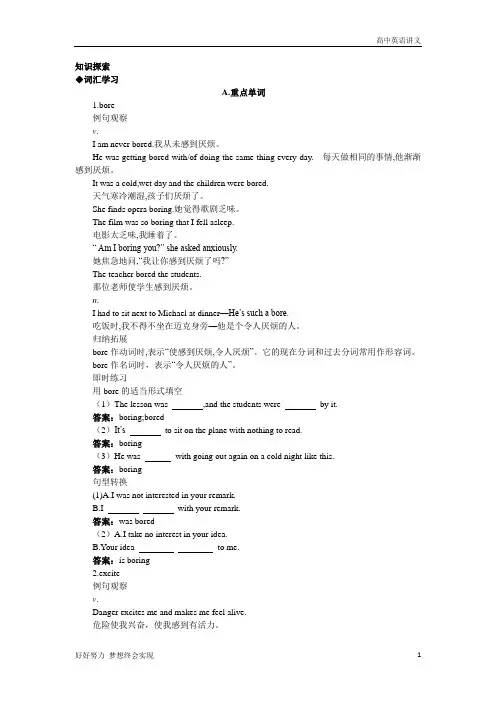
知识探索◆词汇学习A.重点单词1.bore例句观察v.I am never bored.我从未感到厌烦。
He was getting bored with/of doing the same thing every day.每天做相同的事情,他渐渐感到厌烦。
It was a cold,wet day and the children were bored.天气寒冷潮湿,孩子们厌烦了。
She finds opera boring.她觉得歌剧乏味。
The film was so boring that I fell asleep.电影太乏味,我睡着了。
“ Am I boring you?” she asked anxiously.她焦急地问,“我让你感到厌烦了吗?”The teacher bored the students.那位老师使学生感到厌烦。
n.I had to sit next to Michael at dinner—He’s such a bore.吃饭时,我不得不坐在迈克身旁—他是个令人厌烦的人。
归纳拓展bore作动词时,表示“使感到厌烦,令人厌烦”。
它的现在分词和过去分词常用作形容词。
bore作名词时,表示“令人厌烦的人”。
即时练习用bore的适当形式填空(1)The lesson was ,and the students were by it.答案:boring;bored(2)It’s to sit on the plane with nothing to read.答案:boring(3)He was with going out again on a cold night like this.答案:boring句型转换(1)A.I was not interested in your remark.B.I with your remark.答案:was bored(2)A.I take no interest in your idea.B.Your idea to me.答案:is boring2.excite例句观察v.Danger excites me and makes me feel alive.危险使我兴奋,使我感到有活力。
高中英语选修六单词表完整版Unit 1: Artappreciate: vt. 欣赏,赏识masterpiece: n. 杰作,名著gallery: n. 画廊,美术馆sculpture: n. 雕塑,雕塑品abstract: adj. 抽象的,抽象派的Unit 2: Poemsrhythm: n. 韵律,节奏metaphor: n. 隐喻,暗喻imagery: n. 描述,意象verse: n. 诗,诗句rhyme: n. 押韵,韵脚Unit 3: Musicmelody: n. 旋律,曲调harmony: n. 和声,和弦symphony: n. 交响乐conductor: n. 指挥orchestra: n. 管弦乐队Unit 4: Newspapers and Magazineseditorial: n. 社论,评论column: n. 专栏journalist: n. 新闻工作者,记者headline: n. 大,新闻circulation: n. 发行量,传播Unit 5: Films and TV Programmesscript: n. 剧本,脚本episode: n. (电视剧)集,一集director: n. 导演actor: n. 演员actress: n. 女演员Unit 6: Novelsplot: n. 情节character: n. 角色,人物setting: n. 背景,环境theme: n. 主题,题目genre: n. 类型,流派请同学们在学习过程中,不仅要记忆这些单词,还要学会如何在实际语境中运用它们。
通过不断积累和练习,相信大家的英语词汇量和语言运用能力都会得到显著提升。
Unit 7: Theatredrama: n. 戏剧,戏剧艺术stage: n. 舞台,阶段costume: n. 服装,戏装props: n. 道具scenery: n. 布景,风景Unit 8: Adsadvertisement: n. 广告promote: vt. 促进,提升brand: n. 品牌,类型target: vt. 瞄准,针对consumer: n. 消费者,顾客Unit 9: Culturetradition: n. 传统,惯例custom: n. 习俗,习惯heritage: n. 遗产,传统diversity: n. 多样性,差异 identity: n. 身份,特性Unit 10: Historyancient: adj. 古代的,古老的 medieval: adj. 中世纪的modern: adj. 现代的,近代的 era: n. 时代,年代civilization: n. 文明,文化Unit 11: Architecturestructure: n. 结构,构造design: n. 设计,构思foundation: n. 基础,地基arch: n. 拱门,拱形结构dome: n. 圆顶,圆屋顶Unit 12: Literatureprose: n. 散文poetry: n. 诗歌novel: n. 小说essay: n. 论文,散文fable: n. 寓言,神话联想记忆:尝试将单词与熟悉的事物或场景相联系,形成记忆链条。
Unit5 Grammar名师教学设计Book6 Unit5: The Power of Nature Section 3语法课框架单1/ 112/ 11Section 3语法课教学设计3/ 114/ 11DEL C3 深度加工知识Step 3Application(运用)1.Change the following sentences into the -ing form. Put the verbs intothe correct forms.(1)When Rose woke up in the middle of the night,she saw her roomwas as bright as day.(2)After we had stopped the car,we found ourselves trapped in thickfog and couldn't see clearly ahead.(3)Because I had spent all night reading the documents,I was verytired the next day.(4)As the child had never seen a rainbow before,he was very excited.Suggested answers:(1)Waking up in the middle of the night,Rose saw her room was asbright as day.(2)Having stopped the car,we found ourselves trapped in thick fog andcouldn't see clearly ahead.(3)Having spent all night reading the documents,I was very tired thenext day.(4)Having never seen a rainbow before,the child was very excited.2.Do Exercise 4 in Discovering useful structures on Page 37.First ask students to do the exercises individually and then let themdiscuss and check their answers with their partners,and finally give themthe correct answers and deal with any problems they might meet.1.在具体语境中运用ing形式作状语1.学生是否能在具体语境中掌握ing形式的用法5/ 11Exercises请用括号里所给动词的适当形式填空:1. _____ (live) in a southern city of China, I have never seen such a wonderful snow view.2. _____ (not grow) up yet, you’re not allowed to enter the bars.3. _____ (encourage) by the director, the actors performed wonderfully in the play.4. _____ (Know) all this, they made me pay for the damage.5. The students are sitting in the reading-room, _____ (read) all kinds of books. Key:1. Living2. Not having grown3. Encouraged4. Knowing5. reading二、单项选择1.The great hall was crowded with many people, _____ many children _____on their parents’ laps.A. including; seatedB. including; seatingC. included; satD. included; sitting2. _____ for a long time, most of the crops in this area died from lacking water.A. Being no rainB. There was no rainC. To be no rainD. There being no rain3.His letter, _____ to the wrong number, reached me late.4.A. having been addressed B. to have addressed5.C. to have been addressed D. being addressed4."You can't catch me" Janet shouted, ______away. (NMET2005全国卷3)A. runB. runningC. to runD. ran5.More and more people are signing up for Yoga classes nowadays, ______ advantage of the healthy and relaxation benefits. (NMET2005上海卷)6/ 11A. takingB. takenC. having takenD. having been taken6.______ in the queue for half an hour, Tom suddenly realized that he had left his wallet at home. (NMET2004北京卷)A. To waitB. Have waitedC. Having waitedD. To have waited答案1.A。
高中英语选修6unit5重点单词1. Agility (n.): The ability to move quickly and easily.Example: The soccer player's agility allowed him to dodge his opponents and score a goal.2. Stamina (n.): The ability to sustain prolonged physical or mental effort. Example: Long-distance runners require a high level of stamina to complete a marathon.3. Endurance (n.): The ability to endure an unpleasant or difficult task or situation.Example: The hiker displayed great endurance as she climbed the mountain for several hours.4. Flexibility (n.): The ability to bend easily without breaking.Example: Yoga is a great way to improve flexibility and strength.5. Coordination (n.): The ability to use different parts of the body together smoothly and efficiently.Example: Dancers need excellent coordination to perform complex routines.6. Technique (n.): A particular way of doing something, especially one that involves skill or expertise.Example: The swimmer's impeccable technique helped her break the world record.7. Strategy (n.): A plan of action designed to achieve a particular goal. Example: The coach developed a strategy to outplay the opponent's team.8. Dedication (n.): The quality of being committed to a task or purpose. Example: The athlete's dedication to training paid off when she won the gold medal.9. Discipline (n.): The practice of training people to obey rules or a code of behavior.Example: Martial arts promotes discipline and self-control.10. Determination (n.): A firmness of purpose; a resolute decision.Example: Despite facing many obstacles, the athlete's determination led her to achieve her goals.11. Motivation (n.): The reason or reasons one has for acting or behaving in a particular way.Example: The coach's motivational speech inspired the team to give their best effort.12. Competitiveness (n.): The quality of being eager to compete or strive tobe better than others.Example: The athlete's competitiveness drove him to push himself harder in training.13. Sportsmanship (n.): Fair and generous behavior or treatment of others, especially in a sporting context.Example: The player's sportsmanship was praised by both teammates and opponents.14. Sports psychology (n.): The study of how psychological factors affect performance in sports and physical activities.Example: Athletes often seek the help of sports psychologists to improve their mental strength.15. Exercise (v): Engage in physical activity to sustain or improve health and fitness.Example: It is important to exercise regularly to maintain a healthy lifestyle.16. Warm-up (n): A period or act of preparation for a game, performance, or exercise session.Example: Before starting any vigorous physical activity, it is essential to warm up to avoid injuries.17. Cool-down (n): A period or act of gradually reducing exercise intensity after physical activity.Example: Cooling down after a workout helps prevent muscle soreness and promotes recovery.18. Stretch (v): Straighten or extend one's body to its full length, typically so as to tighten one's muscles or in order to reach something.Example: It is important to stretch before and after exercising to improve flexibility and prevent injuries.19. Hydration (n): The process of providing an adequate amount of water to thebody to maintain proper bodily functions.Example: Athletes should pay attention to their hydration levels during intense physical activity to avoid dehydration.20. Nutrition (n): The process of providing or obtaining the food necessaryfor growth, health, and good condition.Example: A balanced diet is crucial for proper nutrition and overall well-being.21. Performance (n.): The action of performing or carrying out a task or activity.Example: The gymnast delivered an outstanding performance, earning a perfect score.22. Injury (n.): Physical damage to the body caused by violence, an accident, or disease.Example: Athletes must be careful to avoid injuries during training and competition.23. Rehabilitation (n.): The process of restoring someone to health or normal life after illness, injury, or other problems.Example: The injured athlete underwent a rigorous rehabilitation program to return to the sport.24. Psychology (n.): The science of the mind and behavior, including feelings, thoughts, and emotions.Example: Mental health is an important aspect of sports psychology that helps athletes cope with pressure.25. Confidence (n.): A feeling or belief that one can rely on someone or something; firm trust.Example: Confidence is key in sports, as it helps athletes believe in their abilities and perform at their best.26. Focus (n.): The state of concentrating all one's attention on a single object or subject.Example: Athletes need to maintain focus during competitions to stay focused on the task at hand.27. Relaxation (n.): The act of relaxing or the state of being relaxed. Example: Relaxation techniques, such as meditation or deep breathing, can help athletes reduce stress and improve performance.28. Teamwork (n.): Coordinated effort of a group of people working together to achieve a common goal.Example: In team sports, teamwork is essential for success, as it allows players to work together effectively.29. Coaching (n.): The activity or profession of teaching and trainingathletes in the skills and techniques of a sport.Example: A good coach can make a significant impact on an athlete's performance and development.30. Equipment (n.): The tools, devices, and clothing used for a particular purpose.Example: Proper sports equipment is crucial for safety and performance, such as wearing protective gear during a contact sport.31. Training (n.): The action of teaching and developing a skill or ability. Example: Athletes undergo extensive training to improve their physical fitness and technical skills.32. Recovery (n.): The process of returning to a normal, healthy, or original condition after a period of illness, injury, or stress.Example: Proper recovery is important for athletes to avoid overtraining and to allow the body to repair and rebuild.33. Balance (n.): The ability to keep or regain a stable position or state. Example: Maintaining balance is crucial in sports like gymnastics and skateboarding, as it helps athletes perform complex maneuvers.34. Concentration (n.): The state of focusing one's thoughts and attention on something.Example: Concentration is essential in sports where split-second decisions can determine success or failure, such as in a tennis match.35. Reflection (n.): The act of thinking deeply or carefully about one's experiences, beliefs, or actions.Example: Athletes often engage in reflection after competitions to analyze their performance and identify areas for improvement.36. Resilience (n.): The ability to bounce back or recover quickly from adversity, illness, or injury.Example: Resilience is a valuable trait for athletes, as it helps them overcome setbacks and continue striving for success.37. Adaptability (n.): The ability to change or adapt to different situations or environments.Example: Adaptability is important for athletes who may face unexpected challenges during competitions, such as changes in weather conditions.38. Inspiration (n.): The process of being mentally stimulated to do or feel something, often as a result of another person's actions or words.Example: Athletes often find inspiration from role models or previous achievements, which motivates them to push themselves further.39. Role model (n.): A person who serves as an example or whose behavior is emulated by others.Example: Many young athletes look up to professional athletes as role models and seek to emulate their success.40. Mentorship (n.): The guidance provided by a more experienced or more knowledgeable person.Example: Mentorship programs in sports provide valuable guidance and support for athletes, helping them develop both on and off the field.。